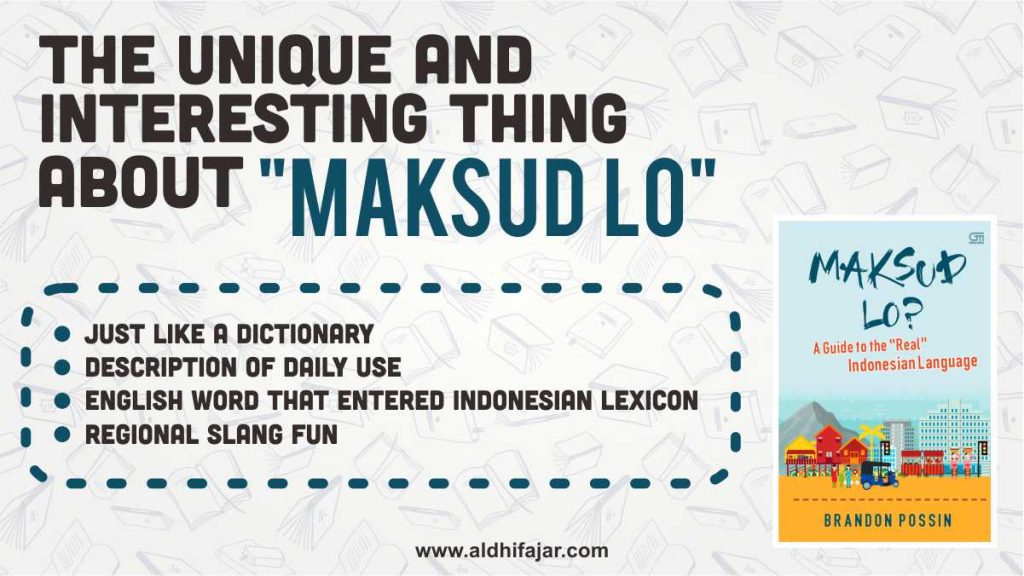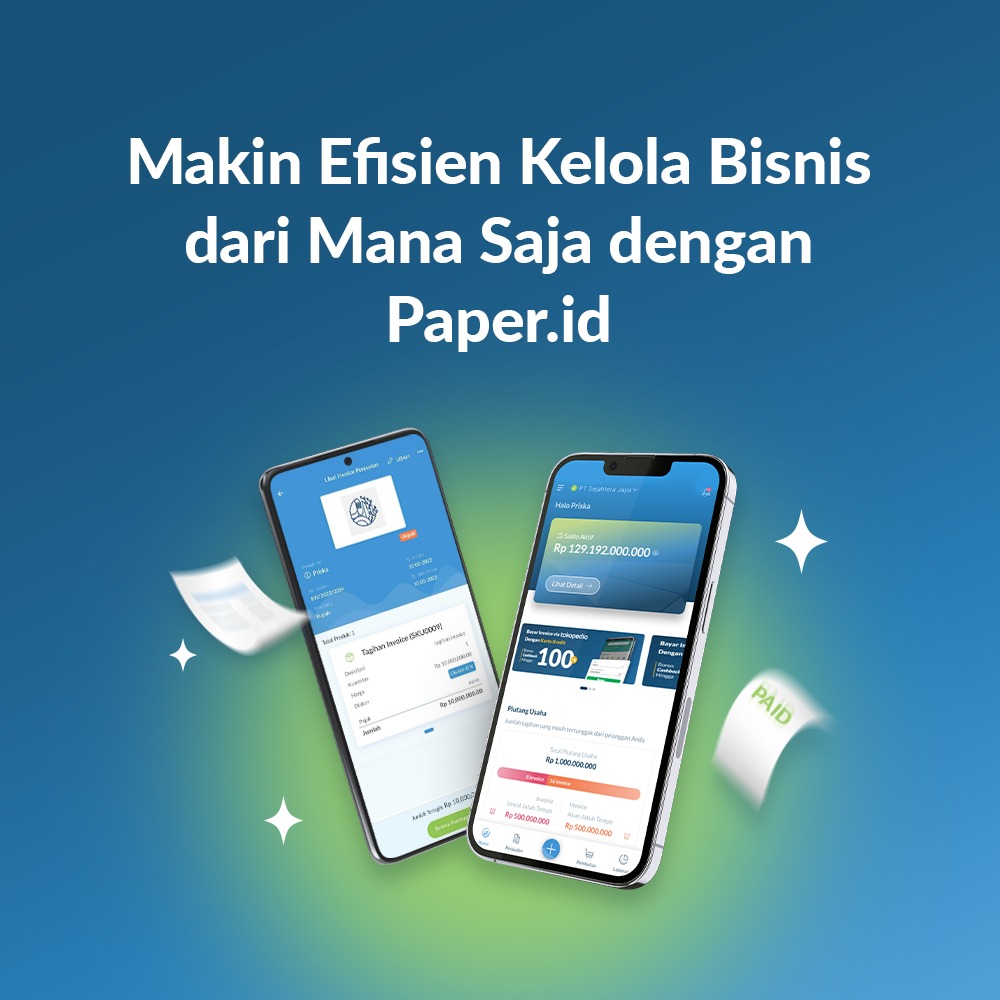While browsing Gramedia Bookstore, I noticed a unique book called “Maksud Lo?” – which turned out to be a guide to the “real” Indonesian language.
I was curious to see what (foreigners) know about Indonesian slang. What made it more interesting is that the terms used are not of the formal Indonesian language – these are actually words frequently used in the daily lives of locals.
So, no wonder foreigners (orang bule) struggle to understand the slang of Indonesian social communities and associations that are often used in daily talk. Almost none of these slang words are written in formal textbooks, yet they form the bulk of daily communication in Indonesia.

This slang is often used and spoken by young Indonesians. Let’s thus dive into this book.
Book Review of “Maksud Lo”
Written by Brandon Possin and published by Gramedia publishers, it is available for purchase online (Brandon Possin Book “Maksud Lo?”) for only Rp. 65.000 in Indonesia and for $19.95 on Amazon in the United States and elsewhere. Possin wrote it with a readable style and clear descriptions of slang words.
What’s unique about “Maksud Lo?”
“Maksud Lo” comprises a variety of slangs often used in Indonesia, not only in daily talk but which also exist in everyday phrases and proverbs.
Some unique and exciting things couldn’t make me stop reading this book cover to cover!

Just like a Dictionary
Presented in the form of a dictionary, the reader can easily understand every word that can be found in daily talk of Indonesian locals. The lexicon, such as acronyms, contractions, verbs, adverbs, and nouns, are available in this book, and organized alphabetically.
Description of Daily Use
In addition, if there is a word uncommonly used in daily talk, the writer then gives an example of conversation or dialogue when the word should be used. One example is the acronym “EGP” or, “emang gue pikirin”, meaning “I don’t care”, which is a phrase that is often used in friendly conversations.
English Words that Entered Indonesian Lexicon
Several borrowed words from English are spoofed or absorbed into Indonesian slang. Most of these borrowed words are often used in daily conversations by some of our communities or peers. For example, the words bestie, fifty-fifty, chill, sis, let’s go, etc.
Regional Slang Fun
In slang, it’s not only the Indonesian language that is used. Some regions such as Yogyakarta, Makassar, Bandung, have their own slangs too. For example, words like asu, sing, belegug, etc. are also often heard in daily conversations in almost every community.
About Brandon Possin
Brandon Possin is an American citizen from Madison, Wisconsin. He graduated from the University of Virginia and has been a guest lecturer at several universities in Chile and Brazil. Brandon has been living in Indonesia for five years as a student of cultural science. He enjoys learning about Indonesian cultures such as Sunda, Sumatera, Madura, Malang, among others.
Possin managed to collect various words commonly used in everyday languages in multiple regions and cities in Indonesia through engaging with a variety of groups and communities around Indonesia.

Possin served at the United States Consulate General in Surabaya; as an economic officer at the US Embassy (Pakistan); and other U.S. diplomatic posts. Additionally, he has also opened the Indonesian market for an Ethereum blockchain venture to improve digital wallet inclusion in Indonesia.
A polyglot, Possin has mastered several languages, including Portuguese, Indonesian, Spanish, Urdu, and Japanese.
Conclusion
Maksud Lo is worth your time, especially to understand the commonly spoken informal language of Indonesia.
.
As the use of slang in Indonesia increases, especially among young people, this is a must-read. Happy reading!






It’s kinda interesting book coz various kinds of non-formal languages in Indonesia are indeed very interesting to learn and follow their development. Salute for foreigner who want to take part in learning Indonesian culture and language as well.
Malu gak sih budaya kita malah ditulis sama orang luar. Mereka jauh lebih paham drpd kita loh. Jadi iri dan salut sama penulisnya nih
Kayanya aku perlu baca buku ini deh, soalnya aku sering lemot kalau menemukan bahasa gaul anak zaman sekarang..
Bule aja tertarik apa bahasa gaul kita, ya. Buku yang menarik banget nih. Pengen punya dan buat menambah wawasan baru tentang bahasa slang.
Cukup bangga juga karena sekarang tambah banyak aja bule yang tertarik dengan adat di Indonesia. Bahkan kalau diperhatikan, mereka banyak lebih paham dari orang Indonesia sendiri hihihi …
Keren aja, sih, in Mas Possin mau nulis tentang bahasa slang kita. Mungkin supaya turis yang datang ke negeri kita bisa lebih mudah berkomunikasi ya… 🙂
Ternyata penulisnya pernah kuliah ilmu budaya di Indonesia ya. Jadi paham tentang bahasa slang di sini, terutama di beberapa daerah di Indonesia. Keren loh dia bisa merangkum bahasa slang dari bbrp daerah shg akan jd panduan bermanfaat bg turis asing yg ingin dtg ke Indonesia.
Menggunakan bahasa Indonesia secara formal dalam kegiatan sehari-hari memang jarang dilakukan, namun bukan berarti tidka mau menggunakan bahasa formal. Bisa jadi karena memang untuk lebih mengakrabkan diri dengan yang lainnya.
Btw, buku ini sepertinya bisa dijadikan referensi dan bahan edukasi bagi masyarakat
I think this book is a good reference, not only for foreigners, but also for Indonesian too.
Since the writer is polyglot, I wonder how he explain Indonesia language based on his point of view.
Jadi inget waktu SMA, ada anak pertukaran pelajar dari Mexico di kelasku. Sejak hari pertama sama temen-temen diajarin bahasa slank. :))
wah penulis buku nya malah seorang bule ya, saya sendiri malah ga tau banyak bahasa slang indonesia
Iya nih, kupikir penulisnya orang Indonesia. Ternyata orang luar. Bangga sih bahasa slang Indonesia dijadiin judul bukunya orang luar negeri.
Kupikir buku motivasi, ternyata tentang budaya bahasa pergaulan di Indonesia, ya. Menarik banget karena ditulis orang asing.
Oalah, ternyata lumayan lama tinggal di Indonesia jadi mengerti sedikit banyak tentang slang di Indonesia apalagi kuliahnya di socio cultural. Pas dong ya hehehe
Salfok, itu authornya bisa jadi polyglot karena sarapan paginya apa Mas? keren amat …
Suka banget sama orang luar negeri yang mengapresiasi budaya dan bahasa daerah kita:D. 5 tahun di Indonesia bisa memahami bahasa daerah kita, amazing. penasaran sama isi bukunya
Sama, berasa bangga banget gitu ternyata budaya dan bahasa daerah kita telah menarik minat orang asing untuk dipelajari.
Diplomat tuh kerjaan keren banget deh.. bisa jalan2 ke banyak negara meski bebannya juga berat sihh.. yang berat juga kalo harus belajar bahasanya apalagi bahasa slang.. kita aja kadang nggak tahu bahasa milenial anak jaman sekarang..
at first I thougt the writer of the book ‘Maksud Lo’ is Indonesian, then absolutely wrong lol.
In my point of view, this book is not only good for foreigner who will come to Indonesia, but Indonesian need to know this good book too
menurutku keren sih, seorang bule yang emang ngelocal banget dan care dengan bahasa indonesia terus bikin buku terjemahan. bantu banget bule yang mau mengunjungi indonesia bahkan orang indonesia itu sendiri
Cocok buat para bule yg mau belajar bahasa gaul Indonesia. Btw, ini bukunya berarti pakai bahasa Inggris ya?
Wah buku yang sangat menarik
Yang nulis orang bule, tapi bicara tentang bahasa orang Indonesia ya
Informal Indonesian languages makes the relationship between interlocutors feel closer and feels like brothers. So in Indonesia, the feeling of brotherhood is as warm as that.
to learn informal Indonesian Language, I think this book is very good for reference to read it. And I definitelly agree that Slang languange could make us connected each other warmly
Bahasa Maksud Lho…sempet booming di kalangan anak muda…eeeh dijadikan judul buku oleh orang luar…aiss kereen dunk..
I do need the book. I’m so curious with what he discuss in this book actually based on his POV.
Wow so inspiring that Brandon write this book. I think I need to read this book, too, wkwkwk
Penasaran banget, jadi pengen baca. Judulnya bahasa slang kita, tapi yang nulis orang luar negeri. Kepo banget sama isinya.
Jdi penasaran sama buku nya,
Nanti mampir ke gramedia di jakarta, smoga udh ada.
Bahasa slang seperti itu malah sering dipakai memang ya daripada bahasa baku. Aku aja pakai bahasa formal Indonesia kalau acara resmi aja. Hehehe sisanya, ya gpp, kek gitu deh hehehe
Seru nih kayaknya buku karya Brandon Possin ini, jadi tambahan pengetahuan untuk kita belajar bahasa slang indonesia. hehe
Iya mba bisa jadi bacaan asyik aja di tengah keseriusan hidup ini hihi
It’s funny to see how Indonesian slang could be attractive as a book title! Tbh, I’m really curious, sih, about this book! Will definitely looking for this book next time I go to Gramedia!
Buku ini recommended banget buat bule yang nggak mau ribet belajar bahasa formal. Soalnya pas di lapangan tentu aja pake bahasa informal biar terkesan merakyat. Keren banget nih penulisnya. Jeli soal pasar.
waaahhh, mas Possin ini oke juga belajar budaya Indonesia selama 5 tahun ya, sampe bikin buku ttg bahasa-bahasa Indonesia
Sometimes we need to learn the real culture of a place or a country from the local. Thats why, learning about the slang languages so important. So happy to know that Brandon Possion wrote a guide book about Indonesian Slang. It will help the traveler or foreigner who came here to have a good conversation. I like the book’s title, by the way.
kok kece ya covernya, judulnya juga agk nyolot gitu jadi penasaran deh pengen baca lengkapmnya hehe
Karena nyolot itulah yang bikin jadi makin penasaran buat dibaca ya mbak.
wah, bisa bahasa Malang sama Madura jugaa ya. aku aja nggak bisa haha. kalo orang luar bahas bahasa malang kayaknya seru ya karena dibalik2 gtu. pengen tahu pendapat mereka
Keren, buku yang pastinya cocok dan membantu bule-bule yang ingin memahami masyarakat Indonesia dengan bergam kultur dan bahasa yang dimiliki.
bener. biar bule2nya bisa diajak ngobrol gaul ala Jaksel ya mbak hihi
bahasa slang kita dari EGP, maksud loh, de-el-elyang beragam ternyata menarik perhatian siapa saja ya heheh.
I think that I need this book, which means I’m still young, right? And I will be young forever wkwkwk